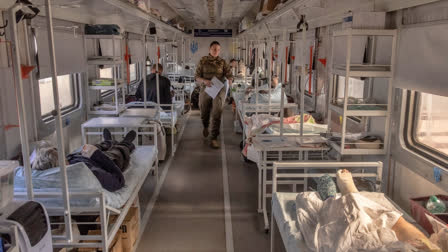It looks like an ordinary train waiting to depart an ordinary station, but through its fogged windows, a Ukrainian serviceman with face injuries lies stretched out on a gurney. All of the other blue-and-yellow carriages of this train operated by the military are carrying wounded soldiers to hospitals away from the precarious front line.
Nearly three years after Russian forces invaded Ukraine, many medical facilities in war-battered eastern Ukraine have been damaged or destroyed, while those left untouched are overcrowded.
For Oleksandr, the army doctor overseeing the evacuation, there are clear benefits to rail: many people can be moved at once and it is safer than transporting wounded soldiers by helicopter, given Russian superiority in Ukraine's airspace.
But there are risks too.
"Our adversary in the war does not distinguish between what's medical and military, so we take certain security measures," the 46-year-old said. AFP was recently granted rare media access to the train, whose points of departure and arrival are not being disclosed for security reasons.
'Everything on the move'
Ambulances arrived at the station carrying dozens of wounded troops who were then hauled onto the train on stretchers and settled on beds with floral-patterned sheets. Ukrainian flags and hand-drawn pictures by children annotated with patriotic messages lined the walls inside the train.
The carriages resemble a hospital until the train rolls away from the platform and gently rocks patients and staff -- and everything else inside -- as it crawls farther from the front. "We do everything on the move, everything. Starting from the usual intravenous injections, ending with incubations," said Viktorya, a nurse dressed in khaki and wearing blue medical gloves.
"We get dizzy afterwards," the 25-year-old said, standing in front of a window, the sweeping Ukrainian landscape rolling by. The journeys to and from the front, where Ukraine is coming under increasing pressure, have given Viktorya a painful insight into the cost of the conflict grinding through its third year.
"I understand the number of wounded now. It's very hard to see it every day," she said. Kyiv -- like Moscow -- is tight-lipped about its soldier casualty count.
President Volodymyr Zelensky in February said the number of Ukrainian servicemen confirmed killed was around 31,000 -- a figure observers say is likely an underestimate -- but the number of missing and wounded has never been disclosed.
